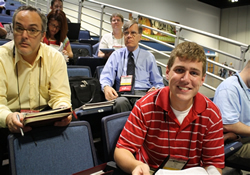
Tyler Ward (front right) was the Kansas West Conference's first lay alternate delegate to General Conference 2012.
LISA ELLIOT DIEHL
I give thanks that people my age have a love for God and God's church. Young friends are doing incredible works, which are transforming lives. However, when I look at how my faith has developed, I think of a few older Christians.
These are the people who planted the seeds that have bloomed into a relationship with Christ and my calling to ordained ministry. I am deeply grateful to these older Christians for opening my eyes and supporting me as a disciple of Christ.
They are also why I am frustrated with the spreading conversation that we young and those older cannot work together in the church.
United Methodists are discerning how we are to continue being a body of faith, love and action far into the future. Within these conversations, I have heard well-intentioned people frame our challenge as the young versus the old, or vice versa. Underlying are the assumptions that our church's fundamental problem is the old not giving up "power" or the young caring more for "modern trends" than faithful doctrine and tradition. Framing the conversation in this way creates a divide that separates the church from the unity and love of one another that should mark it.
I want to challenge these stereotypes for the sake of both unity and dreaming righteously.
First, if we will reflect, I believe many young people would recognize how askew this stereotype is. Looking into the history of our faith, we perceive there was once a time of more flexibility—when people felt called to do something, they did it, and the community followed. The modern church is more formally organized with members serving on committees, leading the local and global church. With this structure, the church tends to elect as its leaders, the most experienced members who have the will to serve. This may equate to local committees full of our older members.
So, what happens when a young person's visionary ideas are rejected or critically evaluated by a committee of older members?
Some respond positively, engaging in dialogue with the committee to develop a common vision together.
However, I have seen too many turn their disappointment at rejection into hate of such committees and they soon believe that the old are unwilling to give up "power."
I have witnessed this scenario many times. If those hurting were to dig deep within themselves and seek the source of their discord with the old, what rationale would they really find?
The second point for us young people to remember is we are a fleeting demographic: no young person will remain young forever. My deepest fear is that if our generation sets up a culture of disrespect for our elders, how will we be treated in our older years of ministry and leadership? Every faithful step we will have made forward could be brushed aside with the only rationale that they were old ideas. Our ideas' relevance for the present and future of the church may not even be considered.
Now is the time to abandon dangerous and blanketing assumptions. This is when we must recognize the great works possible through the unity the young and the old have in Christ.
I dream a future of the church full of vibrancy and, better yet, authenticity. I see a church listening to the creativity and motivation of the young and respecting the perspective and wisdom of the older. Such unity reminds me of Joel's prophesy being fulfilled at the day of Pentecost, when the young and old had visions and dreams together (Acts 2:16-21). This is a future where our motivation and wisdom combine in a beautiful expression of love, which transforms local communities.
What would truly happen if every one of us made it a priority to reach across the fabricated divide and love each other?
My friends, may we hear God's firm words and follow faithfully.
Tyler A. Ward is a freshman at United Methodist-related North Central College, Naperville, lll., majoring in religious studies and psychology. Growing up in Hesston (Kan.) United Methodist Church, he was the Kansas West Conference's first alternate lay delegate to General Conference 2012, a delegate to the 2010 Global Young People's Legislative Assembly and president of the Conference Council on Youth Ministries.
